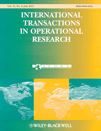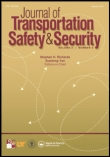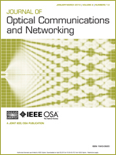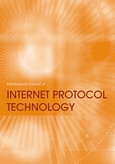
International Journal of Critical Infrastructure Protection
Scope & Guideline
Pioneering methodologies for robust infrastructure systems.
Introduction
Aims and Scopes
- Cybersecurity in Critical Infrastructures:
The journal emphasizes the importance of cybersecurity measures across various critical infrastructures, including power grids, industrial control systems, and urban logistics. Research often explores new methodologies, frameworks, and technologies to enhance security against cyber threats. - Resilience Assessment and Improvement:
A core focus is on assessing and improving the resilience of critical infrastructures against various hazards, including cyber attacks, physical threats, and natural disasters. Studies often involve modeling, simulation, and quantitative assessment techniques. - Interdependence and Network Theory:
The journal highlights the interdependent nature of critical infrastructures, exploring how failures in one system can affect others. Research often utilizes network theory to analyze and optimize the interconnectedness of systems. - Innovative Technologies and Methodologies:
IJCIP publishes work on innovative technologies such as machine learning, blockchain, and software-defined networking (SDN) applied to critical infrastructure protection. This includes the development of new models and systems for threat detection and response. - Policy and Management Strategies:
The journal also addresses the policy and management aspects of critical infrastructure protection, emphasizing the need for effective governance, public-private partnerships, and strategic planning to enhance infrastructure resilience.
Trending and Emerging
- Machine Learning and AI Applications:
There is an increasing trend towards the application of machine learning and artificial intelligence in cybersecurity and resilience assessments. This includes developing predictive models for threat detection and anomaly detection in critical systems. - Blockchain and Decentralized Technologies:
Recent publications indicate a growing interest in utilizing blockchain technology for enhancing security and data integrity within critical infrastructures, particularly in areas like smart grids and metering systems. - Resilience Quantification and Simulation:
A notable trend is the focus on quantitative methods for assessing resilience, including probabilistic models and simulations that help in understanding the impacts of various disruptions on infrastructure functionality. - Cyber-Physical Systems Integration:
Research on the integration of cyber-physical systems is gaining momentum, with studies exploring how interconnected systems respond to cyber and physical threats, emphasizing the need for comprehensive protection strategies. - Policy Frameworks and Governance Models:
Emerging themes also include the development of policy frameworks and governance models that address the complexities of critical infrastructure protection in a rapidly changing technological landscape.
Declining or Waning
- Physical Security Measures:
Research focusing primarily on traditional physical security measures appears to be waning, as the emphasis shifts towards integrated cyber-physical security solutions that address both cyber and physical threats. - General Risk Assessment:
There seems to be a decline in studies that broadly assess risks without a specific focus on technological or systemic improvements. Recent publications favor more targeted assessments that leverage advanced technologies or specific case studies. - Historical Case Studies:
There has been a noticeable reduction in the publication of historical case studies that examine past incidents in critical infrastructure protection. The current trend leans towards forward-looking research that proposes new frameworks and solutions.
Similar Journals

International Transactions in Operational Research
Pioneering Insights in Management ScienceInternational Transactions in Operational Research is a prominent journal published by WILEY, focusing on the dynamic fields of operational research and its applications across various sectors. Since its inception in 1994, the journal has established itself as a reputable source of research, currently holding a Q1 ranking in multiple categories, including Business and International Management and Management Science and Operations Research. With an impact factor that reflects its significance within the scholarly community, the journal serves as a crucial platform for researchers to disseminate innovative methodologies, theoretical advancements, and practical applications in operational research. Despite the absence of Open Access options, subscribers and institutions gain exclusive access to leading-edge studies that propel the field forward, making it an indispensable resource for scholars, professionals, and students alike. Situated in Denmark, the journal's scope is projected to converge through 2025, promising continued relevance in today’s rapidly evolving academic landscape.

Journal of Transportation Safety & Security
Driving the conversation on transportation safety.The Journal of Transportation Safety & Security (ISSN: 1943-9962; E-ISSN: 1943-9970), published by Taylor & Francis Inc, stands as a pivotal resource for professionals and researchers in the fields of safety research and transportation. Since its inception in 2009, this journal has delivered rigorous peer-reviewed articles that explore critical issues relating to safety and security within the transportation sector. With an impressive impact factor reflecting its scholarly significance—ranking Q1 in Safety Research and Q2 in Transportation as of 2023—this journal occupies a unique position in the academic landscape, encouraging innovation and collaboration among researchers dedicated to improving safety measures. The Scopus rankings further affirm its status, placing it 17th out of 109 in Safety Research and 49th out of 141 in Transportation. Readers can expect contemporary discussions and comprehensive reviews tailored to both practitioners and academics alike, effectively bridging the gap between theory and application. Explore the Journal of Transportation Safety & Security to contribute to a safer and more secure transportation environment.

Cybersecurity
Advancing Cyber Resilience Through Innovative ResearchCybersecurity, published by SpringerNature, serves as a pivotal platform in the realms of Artificial Intelligence, Information Systems, Software, and Computer Networks and Communications. With an impressive Impact Factor and an Open Access model initiated in 2018, this journal facilitates widespread dissemination of innovative research findings to a global audience. Based in the United Kingdom, Cybersecurity aims to advance knowledge and application in security innovations, risk management, and system resilience against cyber threats. The journal's current standing is prominently reflected in its Q1 and Q2 ratings across various computer science categories, indicating its reputable contribution to the academic community. By continuously publishing cutting-edge research, Cybersecurity plays a crucial role in informing policy decisions, advancing technology, and enhancing the collective understanding of cyber resilience, making it an essential resource for researchers, professionals, and students alike.

International Journal of Information Security
Transforming Insights into Actionable Security Strategies.The International Journal of Information Security, published by Springer, stands as a premier platform for research in the rapidly evolving field of information security. Operating under ISSN 1615-5262 and E-ISSN 1615-5270, this journal has established a significant academic presence since its inception in 2005. With a commendable 2023 impact factor ranking, it holds a distinguished position in various categories, including Q1 in Information Systems and Safety, Risk, Reliability and Quality, and Q2 in Computer Networks and Communications and Software. This reflects the journal's commitment to publishing high-quality, peer-reviewed articles that advance both theoretical and practical aspects of information security. Researchers and professionals alike will find invaluable insights regarding the latest developments, methodologies, and trends in the field, making it an essential resource for staying current with contemporary challenges and solutions. By fostering a cross-disciplinary dialogue among security specialists, system engineers, and risk managers from around the globe, the journal not only enhances the academic discourse but also contributes to the practical application of findings in the industry.

Future Internet
Advancing Internet Innovations for Tomorrow's ConnectivityFuture Internet is a leading open-access journal published by MDPI, dedicated to advancing the field of Internet technologies and communication networks. Since its inception in 2009, the journal has provided a platform for rigorous research and innovative ideas in the context of the rapidly evolving digital landscape. Based in Switzerland, it has established itself as a prominent publication, earning a commendable Q2 ranking in the category of Computer Networks and Communications for 2023. With a Scopus ranking of #87/395 and a notable 78th percentile, Future Internet fosters interdisciplinary collaboration, making valuable contributions to the understanding of Internet systems, protocols, and applications. Researchers, professionals, and students alike will find a wealth of insightful articles addressing both theoretical foundations and practical implementations. The open-access format ensures that all readers have immediate and unrestricted access to high-quality research, facilitating knowledge dissemination and informed decision-making in academia and industry alike.

Journal of Optical Communications and Networking
Transforming Networking Through Optical InsightsJournal of Optical Communications and Networking, published by Optica Publishing Group, stands at the forefront of research in the rapidly evolving field of optical communication and networking. With an impressive 2023 Q1 ranking in Computer Networks and Communications and a notable Scopus ranking of #53 out of 395, this journal serves as a vital resource for academics and professionals keen on exploring innovative solutions and emerging technologies. Operating under the ISSN 1943-0620 and E-ISSN 1943-0639, it publishes high-quality, peer-reviewed articles that span a wide range of topics from theoretical insights to practical applications in optical systems. As an Open Access publication, it ensures global dissemination of knowledge, allowing researchers and enthusiasts alike to contribute to and access cutting-edge findings. Since its inception in 2009, the journal has fostered a collaborative platform for authors and readers, stimulating advancements in the interconnected domains of optical communications and networking through 2024 and beyond.

Journal of Cloud Computing-Advances Systems and Applications
Harnessing the Potential of Cloud for TomorrowThe Journal of Cloud Computing - Advances Systems and Applications, published by Springer, serves as a premier platform for disseminating cutting-edge research in the fields of cloud computing, computer networks, and software technologies. With an impressive impact factor and ranked in the top quartile for Computer Networks and Communications and Software categories in 2023, this open access journal has gained significant recognition within the academic community since its establishment in 2012. The journal not only provides valuable insights into innovative applications and advancements in cloud technologies but also supports collaboration among scholars, practitioners, and industry leaders. Operating from the vibrant hub of New York City, it boasts a robust international readership, ensuring that the latest findings reach a diverse audience. Authors and researchers are encouraged to engage with this vital resource, which is dedicated to exploring the transformative potential of cloud computing across multiple disciplines.

International Journal of Internet Protocol Technology
Navigating the Evolving Landscape of Internet ProtocolsThe International Journal of Internet Protocol Technology (ISSN: 1743-8209; E-ISSN: 1743-8217), published by InderScience Enterprises Ltd, is an esteemed periodical dedicated to advancing research in the realms of internet protocols and communication technologies. Established in 2005 and headquartered in the United Kingdom, this journal serves as a vital platform for scholars and professionals, providing insights into innovative approaches and emerging trends within the field. With a 2023 Scopus ranking placing it in the Q4 category for Computer Networks and Communications, it continues to contribute to an evolving digital ecosystem. Although the journal does not offer open access, its articles are accessible through institutional subscriptions and provide a wealth of knowledge that aids the understanding and development of internet protocols. Researchers, practitioners, and students will find a range of high-quality studies that explore critical issues and technological advancements shaping global digital communications.

IEEE COMMUNICATIONS MAGAZINE
Pioneering Insights in Electrical and Electronic CommunicationsIEEE Communications Magazine, published by the Institute of Electrical and Electronics Engineers (IEEE), is a leading journal in the fields of Computer Networks and Communications, Computer Science Applications, and Electrical and Electronic Engineering. With an impressive impact factor reflected in its Q1 quartile rankings across multiple categories, this periodical stands at the forefront of technological advancement and innovation. Since its inception in 1979, the magazine has been committed to disseminating high-quality research and insightful reviews that address current issues in communications technology. Targeting an audience that includes researchers, industry professionals, and students, IEEE Communications Magazine strives to foster a deeper understanding of emerging trends and challenges in the communications sector. Its affiliation with IEEE, a global leader in advancing technology, underlines the journal's credibility and significance in supporting scholarly communication in electrical and electronic engineering. The magazine operates without open access options, necessitating subscription or institutional access for its comprehensive content.

Frontiers in Communications and Networks
Empowering Scholars to Shape the Future of ConnectivityFrontiers in Communications and Networks is a prominent open-access journal published by FRONTIERS MEDIA SA, established in 2020 and positioned in the heart of Switzerland. As an interdisciplinary platform, it focuses on advancing research related to computer networks, communications, and signal processing, providing a critical forum for innovative findings and developments in these rapidly evolving fields. With an impressive Q1 ranking in Computer Networks and Communications and a Q2 ranking in Signal Processing as of 2023, this journal is highly regarded among scholars and practitioners seeking to disseminate their work to a broad audience. By offering open-access options, it ensures that the research is widely available, fostering collaboration and knowledge sharing across the globe. Researchers, professionals, and students are encouraged to engage with the journal as it aims to encapsulate the burgeoning advancements shaping our digital communication landscape.